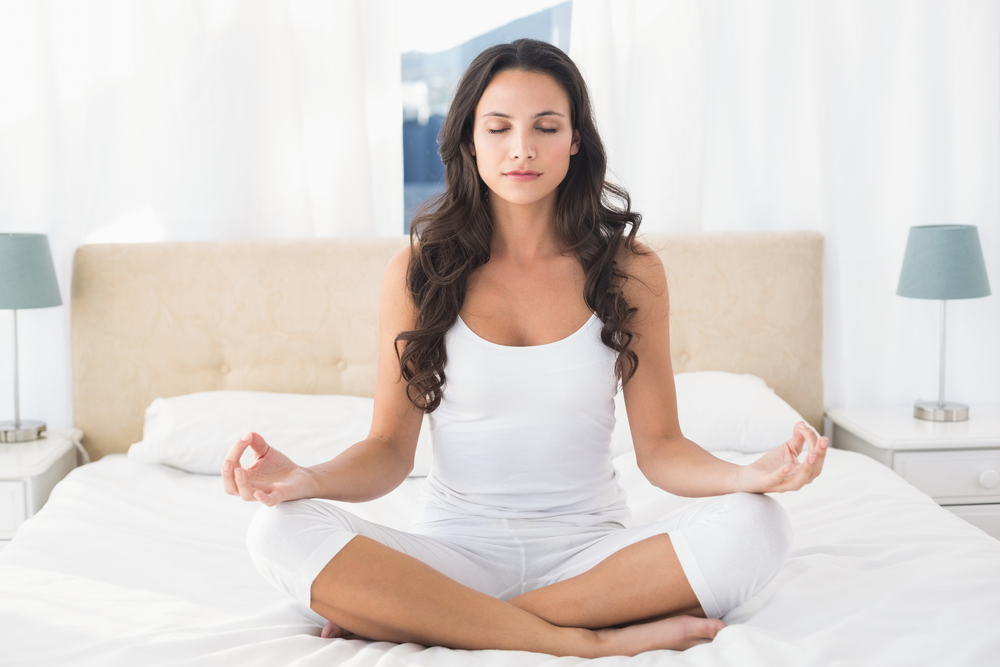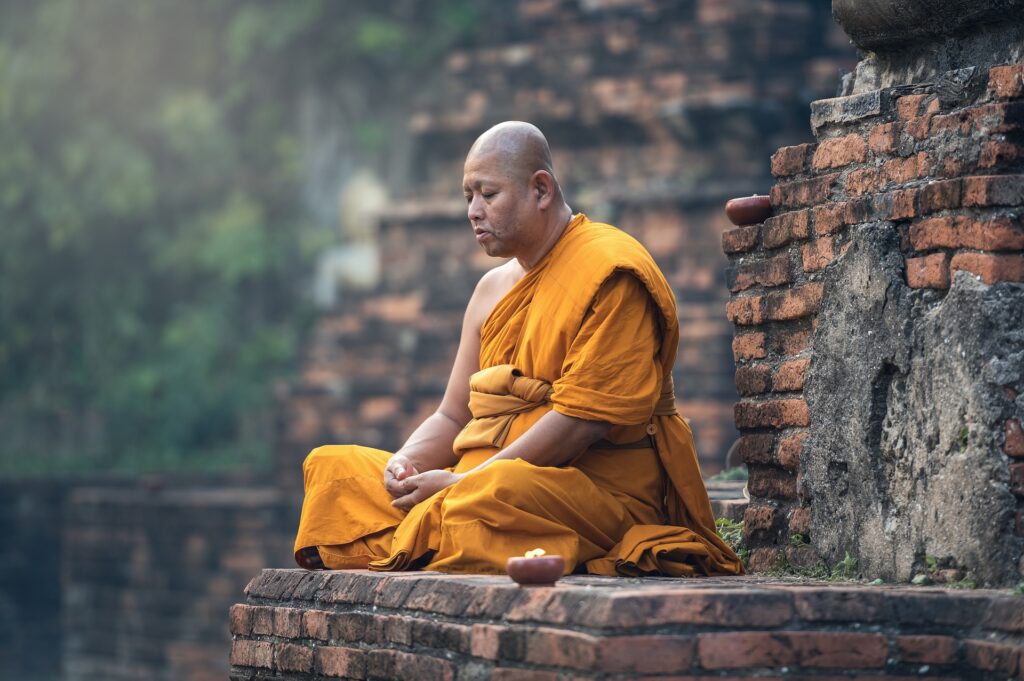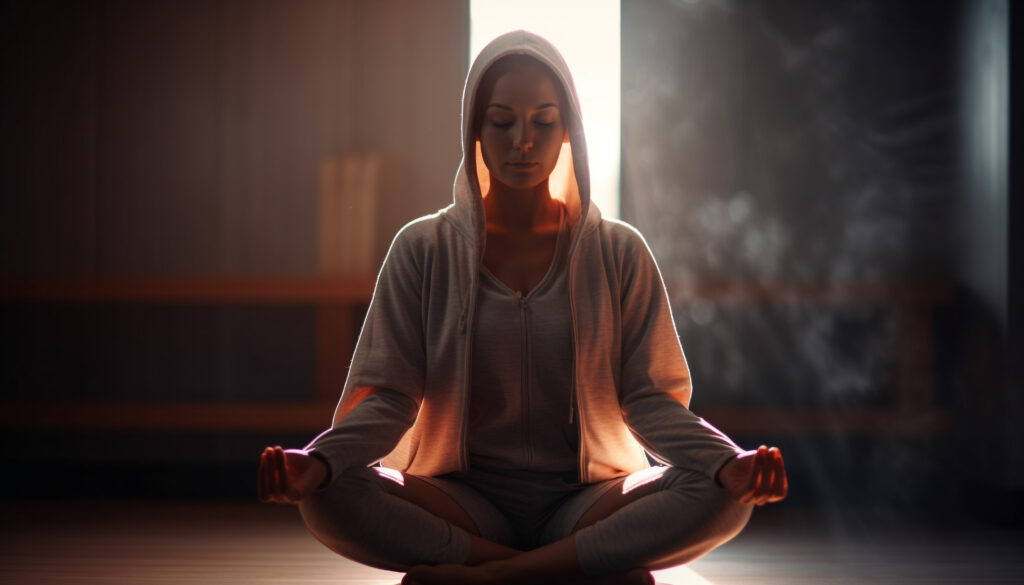
Ever settled into meditation, ready to find inner peace, only to find yourself fighting off drowsiness? Don’t worry, it happens to the best of us! Meditation is supposed to be calming and relaxing, but sometimes that relaxation can tip over into sleepiness.
This article explores why you might feel sleepy during meditation and offers tips to stay alert and focused on your practice. Remember, feeling sleepy doesn’t mean you’re doing it wrong! It just means you might need to adjust your approach a little.
Also Read: Discover the Power of 7 Chakra Meditation: A Journey to Inner Balance and Healing
Why Does Meditation Make You Sleepy?
There are a few reasons why meditation can induce sleepiness:
- Relaxation Response: Meditation activates the relaxation response in your body. This response slows your heart rate, lowers blood pressure, and promotes feelings of calmness. These are all great things for stress reduction, but they can also make you feel drowsy.

- Focus on Breath: Many meditation techniques involve focusing on your breath. While this can be very calming, focusing on a repetitive sensation like breathing can lull you into a sleep-like state.
- Time of Day: If you meditate right before bed, your body’s natural sleep-wake cycle might be working against you. You might be more prone to feeling sleepy during evening meditation sessions.
- Full Stomach: Meditating on a full stomach can also contribute to drowsiness. It’s best to practice on an empty stomach or at least a few hours after eating.
- Lack of Sleep: If you’re chronically sleep-deprived, meditation can be a welcome opportunity to catch some Zzz’s, even unintentionally.
Also Read: What is Self-Reflection Meditation? A Comprehensive Exploration
How to Stay Awake During Meditation?
Even though feeling sleepy is common, there are ways to stay more alert during your meditation practice:
- Choose the right time: Avoid meditating right before bed. Opt for mornings or afternoons when you’re naturally more awake.
- Find a comfortable position: Being uncomfortable can make it harder to stay focused and increase sleepiness. Sit up straight, but not rigid, and find a position that allows you to relax without slouching.

- Open your eyes (optional): Some meditation practices involve closing your eyes, but if sleepiness is a problem, try meditating with your eyes slightly open. Focus on a soft spot in front of you, not staring intently.
- Shorten your sessions: If you’re new to meditation, start with shorter sessions (5-10 minutes) and gradually increase the duration as you become more comfortable.
- Engage your senses: Some meditations incorporate light sounds or scents. This can help keep your mind alert and focused on the present moment.
- Practice body awareness: Pay attention to subtle sensations in your body, like the feeling of your breath moving. This can help keep your mind engaged and prevent drowsiness.
- Move your body: If you find yourself getting too sleepy, take a short break and do some gentle stretches or walking meditation.
- Get enough sleep: Prioritizing good sleep hygiene can improve your overall alertness and make you less likely to fall asleep during meditation.
Also Read: Forest Bathing And Nature Therapy: What It Is and Where to Do It
Remember, Be Kind to Yourself!
Don’t get discouraged if you still feel sleepy during meditation sometimes. It’s a normal experience. The key is to be gentle with yourself and focus on making progress over time.
Additional Resources:
- Mindful.org: https://www.mindful.org/
- Headspace: https://www.headspace.com/
- Calm: https://www.calm.com/app/meditate
These resources offer guided meditations, tips for beginners, and information on different meditation techniques.
If You’re Feeling Overwhelmed:
If you’re struggling with persistent suicidal thoughts, please know that help is available. You are not alone. Here are some resources that can provide immediate support:
- National Suicide Prevention Lifeline: 988 (US)
- Crisis Text Line: Text HOME to 741741 (US)
- The Trevor Project: 1-866-488-7386 (US) (LGBTQ+ youth)
Remember, reaching out for help is a sign of strength. There are people who care about you and want to help you through difficult times.
Also Read: What is Telemedicine and its Role in healthcare? A Comprehensive Guide
Why You Get Sleepy When You Meditate: FAQs
Feeling sleepy during meditation can be frustrating, but it’s a common experience. This FAQ section tackles your questions and offers solutions to keep you focused and awake during your practice.
- Isn’t meditation supposed to be relaxing? Why does it make me sleepy?
Meditation does activate the relaxation response in your body, which is a good thing for stress reduction. This response includes a slower heart rate, lowered blood pressure, and feelings of calmness. These calming effects are great for managing stress, but they can also contribute to drowsiness.
- I focus on my breath during meditation. Isn’t that what I’m supposed to do? Why does it make me sleepy?
Focusing on your breath is a core component of many meditation techniques. While it fosters calmness, focusing on a repetitive sensation like breathing can lull you into a sleep-like state. If this happens, try incorporating other mindfulness techniques to stay engaged.
- Is meditating right before bed a bad idea?
Yes, meditating right before bed can make you more prone to sleepiness. Your body’s natural sleep-wake cycle might work against you if you try to meditate when you’re already winding down for the night. Opt for mornings or afternoons when you’re naturally more awake.
- I ate a big lunch right before meditating, and I fell asleep! Does what I eat affect sleepiness?
Absolutely! Meditating on a full stomach can be a recipe for drowsiness. It’s best to practice on an empty stomach or at least a few hours after eating a meal. Your body is busy digesting food, and focusing on meditation can be more challenging.
- I’m not sleeping well at night. Could that be why I’m falling asleep during meditation?
Chronic sleep deprivation can make you more susceptible to feeling sleepy during meditation. Prioritizing good sleep hygiene, like establishing a regular sleep schedule and creating a relaxing bedtime routine, can improve your overall alertness and make you less likely to doze off while meditating.
- Do I have to sit in a certain position to meditate? Could that be making me sleepy?
Being uncomfortable can make it harder to stay focused and increase sleepiness. While traditional meditation postures involve sitting, the most important thing is to find a comfortable position that allows you to relax without slouching. Experiment with different positions and see what works best for you.
- Everyone says to close your eyes when meditating, but that makes me drowsy. Can I meditate with my eyes open?
Meditation doesn’t require closing your eyes. If sleepiness is a problem, try meditating with your eyes slightly open, focusing on a soft spot in front of you without staring intently. This can help keep your mind alert and focused on the present moment.
- My meditation sessions are an hour long. Is that too long if I’m feeling sleepy?
If you’re new to meditation, starting with shorter sessions (5-10 minutes) is a good idea. Gradually increase the duration as you become more comfortable. Long sessions can be challenging, especially when you’re just starting out.
- Is it okay to move around during meditation? I feel restless if I sit still for too long.
Absolutely! If you find yourself getting too sleepy or restless, taking a short break and doing some gentle stretches or walking meditation can help. There are even meditation practices specifically designed for movement.
- I’m still struggling with sleepiness during meditation. What else can I do?
Don’t get discouraged! Meditation takes practice. Here are some additional tips:
- Engage your senses: Some meditations incorporate light sounds or scents. This can help keep your mind alert and focused on the present moment.
- Practice body awareness: Pay attention to subtle sensations in your body, like the feeling of your breath moving. This can help keep your mind engaged and prevent drowsiness.
- Be patient and kind to yourself: Remember, meditation is a journey, not a destination. Some days you might feel sleepy, and that’s okay. The key is to focus on making progress over time.

